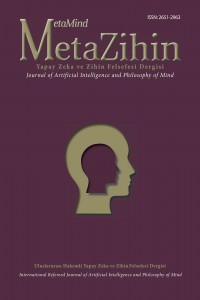Hume’da Kendilik ve Zaman İdeleri: Bu İki İde Uzlaştırılabilir mi?
kendilik, zaman, yanılsama, gerçeklik, uzlaştırılabilirlik
The Ideas of the Self and Time in Hume: Are these Two Ideas Reconcilable?
the self, time, illusion, reality, reconcilability,
___
- Baxter, Donald LM. (2016). “Hume on Space and Time.” In P. Russell (Ed.), The Oxford Handbook of Hume (pp. 173-190). Oxford: Oxford University Press.
- Descartes, Rene (1985a). Meditations on First Philosophy. In J. Cottingham, R. Stoothoff, & D. Murdoch (Eds.), The Philosophical Wrings of Descartes (Vol. I, pp. 1-63). Cambridge: Cambridge University Press.
- Descartes, Rene (1985b). Discourse on the Method. In J. Cottingham, R. Stoothoff, & D. Murdoch (Eds.), The Philsophical Wrings of Descartes (Vol. II, pp. 111-151). Cambridge: Cambridge University Press.
- Garrett, Don (1981). “Hume's Self-Doubts about Personal Identity.” The Philosophical Review, 90(3): 337-358.
- Garrett, Don (2008). “Hume’s Theory of Ideas.” In Elisabeth S. Radcliffe (Ed.), A Companion to Hume (pp. 41-57). Oxford: Blackwell Publishing.
- Giles, James (1993). “The No-Self Theory: Hume, Buddhism, and Personal Identity.” Philosophy East and West, 43(2): 175-200.
- Hume, David (2007). A Treatise of Human Nature. In David F. Norton & Marry J. Norton (Eds.), A Treatise of Human Nature: A Critical Edition, Vol. I, (pp. 1-401). Oxford: The Calderon Press.
- Locke, Johne (1999). Essay Concerning Human Understanding. Pennsylvania: Pennsylvania State University Press.
- Melamed, Yitzhak Y. (2014). “What is Time?” In Aaron Garrett (Ed.), The Routledge Companion to Eighteenth Century Philosophy (pp. 232-244). London & New York: Routledge.
- Mermin, N. David (2009). “What's Bad About This Habit.” Physics Today, (62): 8-9.
- Morrison, Ronald P. (1978). “Kant, Husserl and Heidegger on Time and Unity of 'Consciousness'.” Philosophical and Phenomenelogical Research, 39(2): 182-198.
- Penelhum, Terence M. (1976). “The Self in Hume's Philosophy.” The Soutwestern Journal of Philosophy, 7(2): 9-23.
- Pitson, Tony (2002). Hume's Philosophy of the Self. London & New York: Routledge.
- Waxman, Wayne (2008). “Hume and the Origin of Our Ideas of Space and Time.” In Elisabeth S. Radcliffe (Ed.), A Companion to Hume (pp. 72-88). Oxford: Blackwell Publishing.
- ISSN: 2651-2963
- Yayın Aralığı: Yılda 2 Sayı
- Başlangıç: 2018
- Yayıncı: Murat ARICI
Hume’da Kendilik ve Zaman İdeleri: Bu İki İde Uzlaştırılabilir mi?
Fichte’nin Mantıksal, Ahlaki ve Öznelerarası Özbilinci: Bilime Konu Edilemeyen Ben
Deneyimsel Şeffaflığın Türleri
Mehmet Hilmi DEMİR, Murat ARICI
George Herbert Mead Düşüncesinde Kendilik: Sosyo-Ontolojik Bir Analiz
